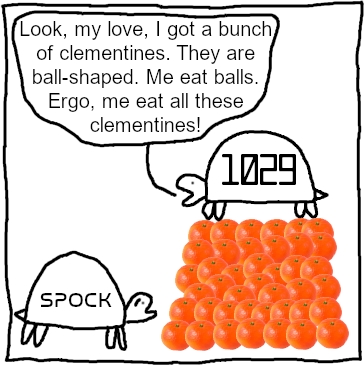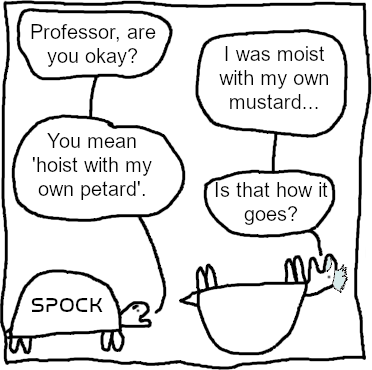And of course another thing is to change the direction of code interpretation as often as possible. That's why the example codes are written in a zigzag manner.
Yeah, I guess anything more complex or supposedly useful would need some sort of redundancy for robustness. The easiest way I can think of to reduce data degradation is to enlarge the data array enormously so that the bit flipping is less likely to hit the meaningful data, but that of course is not completely secure.
Andre Geim got the Ig Nobel for this. He is the only person this far to have got both the Ig Nobel and an actual Nobel prize.
Well, Python is my main programming language, so things being made with it gives me a feeling that I can understand and control them. Sometimes this feeling is even right, for example with Qtile, which is also configured with Python.
Qtile, just because it's Python-based.
Thamk you!
Reading also the earlier strips might help with that. (Unless your problem is specifically with the last panel punchline. That's just about different interpretations of the word "how".) Anyway, thanks for reading!
Xonsh. For basic use (running CLI programs with arguments) it works like any other shell, and for other uses it has nice Python syntax (and libraries!). For example, I like not needing a separate calculator program, as I can do maths directly in the shell with an intuitive syntax.
I like Terminator for its mouse-controlled multiplexing. I also like the fact that it's made with Python, although I haven't utilized this fact in practice.
I'll start with Shiofaioth:
Fuin huomo, aokae lie-laik-duei mas uin toroic kuin uin poulaiseir, bue-ecoidae-duei faelid dai opia, daet hui toroic soe-baisen-xoai iroitedaefa hein touras huic poulaiseir-ki duil Rio Hudson.
I don't know what Nitter is, but I think bird.makeup might be what you are looking for.










Even though I meant the second question as a kind of a synonym for the first one and the latter two as jokes, I'll answer all four separately myself to keep on monologuing.